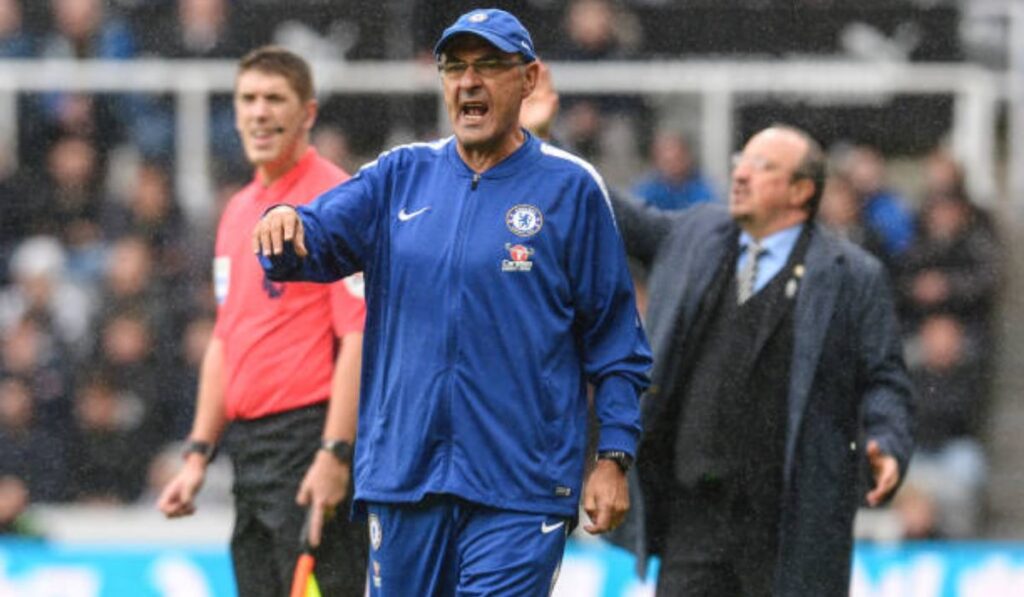Maurizio Sarri Regrets Leaving Chelsea: His Biggest Career Mistake
Maurizio Sarri, who managed Chelsea during the 2018/19 season, has recently reflected on his decision to leave the club, calling it the “most fundamental error” of his career. Sarri’s single season at Chelsea was marked by notable achievements but was followed by his return to Italy, a move he now regrets.
Key Points of Sarri’s Tenure at Chelsea
Successes:
- Premier League Finish: Chelsea finished third in the Premier League, securing Champions League qualification after placing fifth the previous season.
- Europa League Triumph: Sarri led Chelsea to a comprehensive Europa League victory, winning all 13 matches in the campaign and defeating Arsenal 4-1 in the final. This marked Sarri’s first major trophy as a manager.
- League Cup Final: Chelsea reached the Carabao Cup Final but were narrowly defeated by Manchester City on penalties, after eliminating strong teams like Liverpool and Tottenham.
Challenges:
- Player Adaptation: Sarri introduced a new tactical system to Chelsea, famously known as “Sarri-ball,” which involved quick, short passes and a high defensive line. While initially successful, it faced criticism during periods of inconsistent performance.
- Transfer Market: Despite significant spending, including the high-profile arrivals of Kepa Arrizabalaga and Jorginho, integrating these players effectively into his system was a challenge, particularly with Kepa’s form being inconsistent.
- Fan and Media Scrutiny: Sarri faced skepticism from sections of the Chelsea fanbase and media, especially during a mid-season dip in form, which added pressure despite the club’s overall success.
Sarri’s Departure and Reflections
Reasons for Leaving:
- Desire to Return to Italy: At the time, Sarri cited a strong desire to be closer to his elderly parents as a significant reason for his return to Italy, where he took up the managerial position at Juventus after departing Chelsea.
- Abramovich Era: Sarri acknowledged the challenging environment at Chelsea under Roman Abramovich, where managers rarely stayed beyond two seasons. Despite this, he now feels he should have prioritized his career in the Premier League over returning to Italy.
Regrets:
- Missed Premier League Opportunity: Reflecting on his decision, Sarri expressed regret over not staying longer in the Premier League, where he believed Chelsea had the potential for continued success.
- Personal Reflections: Sarri admitted that his personal desire to return to Italy should have been secondary to the professional opportunities and challenges Chelsea and the Premier League offered.
Quotes:
“We had everything required to remain… It’s a difficult club to work at where you probably don’t get to finish the second season, as practically nobody did in the Roman Abramovich era… I made an enormous error that I should’ve avoided. The desire to return to Italy should’ve been inferior to the desire to stay in the Premier League.” — Maurizio Sarri .
Legacy and Impact
Sarri’s departure from Chelsea was followed by a single season at Juventus, where he won the Serie A title but was dismissed due to early Champions League elimination. His subsequent tenure at Lazio lasted until March 2024, after which he resigned.
Positive Influence:
- Europa League Success: His triumph in the Europa League remains a notable highlight of his managerial career and provided Chelsea with European silverware during a period of managerial instability.
- Foundation for Success: Sarri’s season laid down a foundation that future Chelsea managers could build upon, notably integrating players like Jorginho and shaping the tactical approach of the team.
Lessons Learned:
- Career Decisions: Sarri’s reflection on his decision underscores the importance of balancing personal and professional considerations, especially in high-pressure roles within top-tier football management.
In conclusion, Maurizio Sarri’s time at Chelsea, though brief, was marked by significant achievements and a profound impact on both the club and his own career. His regret over leaving highlights the challenging nature of managerial decisions in elite football and the lasting implications they can have on a manager’s legacy .
Maurizio Sarri Regrets Leaving Chelsea: His Biggest Career Mistake

